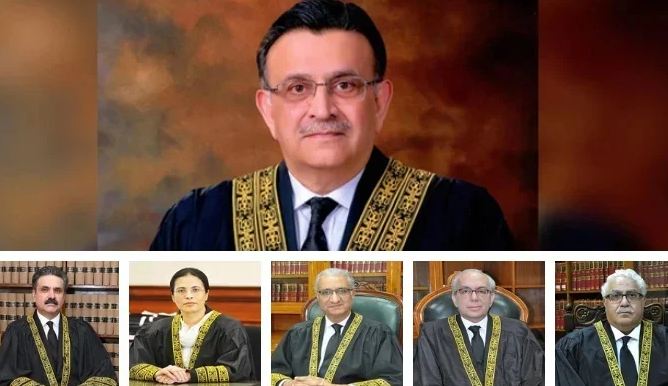SC rejects plea seeking full court in civilians’ military trial case

ISLAMABAD: The Supreme Court on Wednesday rejected a plea seeking the constitution of a full court to hear a set of petitions challenging the trial of civilians in military courts.
“Full court is not available till September,” Chief Justice of Pakistan (CJP) Umar Ata Bandial said while announcing a reserved verdict on Karamat Ali’s fresh plea filed on Monday.
A six-member bench, comprising CJP Bandial, Justice Ijazul Ahsan, Justice Munib Akhtar, Justice Yahya Afridi, Justice Sayyed Mazahar Ali Akbar Naqvi, and Justice Ayesha Malik, was hearing the case.
It may be noted that the trials of civilians arrested for involvement in the May 9 riots, have not been started yet, Attorney General for Pakistan (AGP) Mansoor Usman Awan informed the court at an earlier hearing.
The CJP also expressed hope that the civilians would not be tried till the conclusion of the ongoing case.
While announcing the verdict, the CJP said that court holidays are going on while there are other engagements of the judges as well, which are being affected by this case.
He said that a full court was formed by dissolving other benches on two occasions earlier.
The CJP then turned down the plea, saying a full court was not available till September.
Later, AGP Awan gave arguments on the matter of granting the right of appeal to people to be tried in military courts.
“The army men, who don’t have basic human rights, are tried in the military courts,” Justice Muneeb Akhtar said, while asking how would the civilians, who have human rights, be tried in military courts.
The AGP informed the court that he has taken up the matter of granting the right of appeal with the Cabinet Committee on Law.
He said that the adjutant general must be consulted on the legislation relating to granting the right of an appeal, and a number of issues must be considered in this regard.
CJP Bandial then directed the AGP to continue his arguments at the next hearing and adjourned the proceedings till tomorrow (August 3).
The full court plea
On July 31, Ali moved the SC via his lawyer Faisal Siddiqi, to constitute a full court for the ongoing hearing on the petitions, with the submission that only a judgment of the full court can counter any future contemptuous attempt to sabotage any judgment passed in this present petition as well as the connected petitions.
“The full court should include all judges willing and available for the adjudication on the fundamental and complex constitutional and legal questions,” Ali argued in the fresh application filed under Order 33 Rule 6 of the Supreme Court Rules 1980 via his lawyer Faisal Siddiqui.
CJP Bandial, before reserving the verdict on this plea yesterday, directed all the petitioners to give their stance on the matter. Only Siddiqi and the lawyers of Zaman Khan Wardag had favoured the request.
The initial petitions
Following the arrests made in connection with the violent riots that erupted across the country on May 9, the government announced its decision to hold military court trials of those found guilty of damaging and attacking military installments — a move both the government and the army considered a low blow.
In light of this decision, PTI Chairman Imran Khan, Khawaja, legal expert Aitzaz Ahsan, and five civil society members, including Piler Executive Director Karamat Ali, requested the apex court to declare the military trials “unconstitutional”.
In this petition filed through his lawyer, the former CJP pleaded that Section 2(1)(d)(i) and (ii) of the Pakistan Army Act were inconsistent with the fundamental rights granted by the Constitution and should be struck down.
Moreover, five members of civil society from different cities — represented by Siddiqi — appealed to the apex court to declare illegal the trial of civilians in the military courts.
Similarly, Ahsan’s petition challenged the government’s decision to try civilians in military courts.
Related News

Shehbaz, Qatar Amir Pledge to Strengthen Fraternal Relations
LONDON, FEB 17: Prime Minister Muhammad Shehbaz Sharif held a telephone conversation with His HighnessRead More

Experts call for ‘One-Stop’ crisis centers to combat VAW as cybercrime surges
ISLAMABAD, Feb 17: Experts and digital rights advocates have stressed the need for an urgentRead More


Comments are Closed